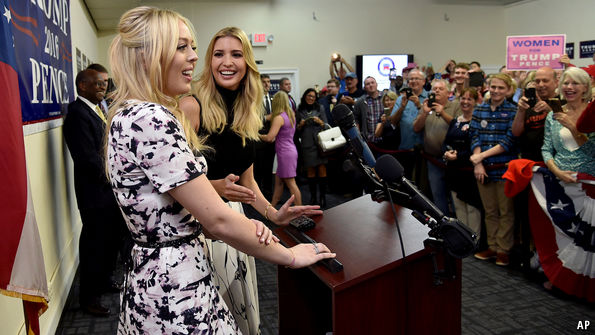
MARSHALLED on stage at the climax of a debate or rally, the Trump family can seem otherworldly, even faintly sinister. In contrast to the everyman image many politicians try to project—the guy like you, with whom you might enjoy a beer—the Republican nominee’s clan is impossibly well-clad and -coiffed. That collective image is of a piece with the paterfamilias’s implicit promise: not so much to represent the nation as to redeem it, like some baggy-suited Superman. An event on October 26th in Marietta, Georgia, which featured Ivanka Trump and her less-deployed sister Tiffany, exemplified his offsprings’ role in his appeal and his campaign.
Mr Trump will probably win in Georgia, but victory isn’t nearly as assured as it ought to be, or might have been for a different Republican candidate. A recent poll for the Atlanta Journal-Constitution makes the reason for the uncertainty clear: leading narrowly in the state overall, he trails 48% to 37% among women, many of whom, like others across the country, were distressed by the videotape from 2005 in which Mr Trump brags about committing sexual assault, and by the subsequent slew of accusers who say he molested them.
Not surprisingly, those waiting for the Trump sisters at the local Republican HQ were inclined to downplay those charges. Debbie, a party volunteer, waved a “Women for Trump” sign amid placards accusing Hillary Clinton of the routine range of cardinal sins. “I’m not going to hold that against him,” she said of the dirty talk, adding, formulaically, that the Clintons had done much worse. After all, Mr Trump was “not a polished politician”—an astonishingly flexible mitigation, enlisted both to finesse the hard truths he utters and excuse the lies and insults he shouldn’t have. As for Ivanka Trump, she was definitely an asset, the epitome of American womanhood: a daughter, businesswoman and mother who “does it all.”
“I love the entire family,” said Paulette, an African-American Trump fan, in the crowded, airless room inside. The Trump children were “honourable, respectful, well-educated, honest.” If they seemed remote, that was because “Donald Trump and his wives have invested a lot in them.” As for Ivanka: “I adore her.” (She wasn’t bothered by the gruesome tape: “I have five brothers and I know how men talk.”) That view of the elder Trump sister was widespread. “She represents smart women who know the issues,” said another female attendee.
The crowd broke out the now-familiar chants of “Hillary for prison”, “Lock her up”, and “We are deplorable”, interspersed with the odd rebel yell. Herman Cain, the warm-up act, delivered the standard denunciation of the media (liars) and the polls (rigged), before introducing Ivanka and Tiffany. Ivanka spoke only briefly, not mentioning the ideas for childcare credits and maternity leave that have bolstered her father’s pitch to women. Tiffany was even briefer. The crowd didn’t seem to mind. “You’re amazing,” a devotee yelled; “We love you” shouted another. Then the Trumps got down to the serious business of the afternoon, namely posing for their supporters’ selfies, before moving on to a meeting with local businesswomen.
Political rallies are like violence: to those in the thick of them, they feel all-consuming, the centre of the world, even if from a distance they turn out to be insignificant. The views of diehard Trump supporters are unrepresentative, a fact that may prove more than usually disorienting for some of them on November 9th. But events such as this are revealing all the same, about both the priorities of the campaign—in this case, its last-gasp struggle to win back women voters—and its semiotics. In the embrace of the Trump family there is hint of a submerged yen for monarchy which, in America, seems to have cross-fertilised with a worship of celebrity—and helped to propel Mr Trump’s candidacy. In what may have been a telling slip, a woman in Marietta said she hoped one of his children would “reign” after their father.
www.economist.com

No hay comentarios.:
Publicar un comentario